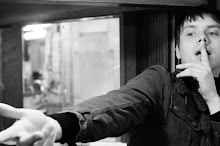Nagorno-Karabakh
To most who've heard this word before, it usually brings to mind only one thing: a 5 year war that killed 30,000 people and left both Azeri and Armenian relations and economies in tatters.
Aghdam. The sound itself is as unpleasant and heavy as what it represents - city of formerly 100, 000 inhabitants, bombed, sacked, looted and left to stand empty for 13 years in no-man's land.
It turns out that we need a visa, as Karabakh regards itself as a country, despite the fact that the rest of the world (minus Armenia) disagrees. Naturally, the embassy has moved and we have to travel to the grotty outskirts of Yerevan, to find it standing regally in between two crumbling housing estates. $25, 3 hours, a few basic questions and an offer of a taxi driver for $250 to drive us there (rejected), and we all have visas.
Junko and I have found one other person to travel with. Pablo poses as an Argentinian school teacher, whilst being an Italian / Argentinian duel-national journalist and a huge fan of Ryszard Kapuscinski. He's been practically everywhere. Thanks to a dark complexion and the ability to grow a 4 finger long beard (official Taliban requirement), he's even managed to hang out in Kandahar. I tell him about Aghdam. He also thinks that going there a great idea.
Most people would think otherwise. The city is in a restricted military area and the embassy will not give us permission to visit. Landmines pepper the disused side-streets, and if one ventures past the mosque, there is a small chance of being targeted by an Azeri sniper from the other side of the line of control.
3 days later, after yet another infuriating negotiation involving 3 people talking at me simultaneously in 3 different languages, we have a taxi driver and a decent price. The drive is stunning. All of Karabakh is covered by snow-capped mountains and green meadows (albeit full of landmines). We pass a tank manouvering by the side of the road, a platoon of soldiers, and derelict houses. Coming to a small town, we spot a high-rise peppered with bullet holes. Pablo decides to take some happy snaps.
Bad move.
As soon a we make it back to the car, 2 men appear from nowhere and the usual starts: "Who are you? Where are you from? Why are you photographing this? Why does this interest you?" Not long after, a police car arrives and we are driven to the local station.
It's like a scene from a Bond movie. The police commissar has two gold canines, a tatooed hand, and I can almost spot the shadow left by the Lenin portrait that would have hung on the wall behind his head 15 years ago. He takes my passport and flicks through it at a well-practiced snail's pace. Meaning: I could do this a lot faster, but I am in control of everything here, including time.
Next, the inane questions: "It says here you are registered as living in Belarus, but you said you are from Poland." I have to explain to him that my Belorussian visa was valid for 13 days, and hence it's unlikely that I reside in Belarus, despite the registration required by Lukashenka's soviet-style government. I win. Next: "Why does it say 'Ankara' on your Uzbekistan visa?" "How did you come to Armenia?" "How did you come to Turkey?" and so on for half an hour. Junko's passport is next. He is only interested in the Pakistan visa, despite the fact that she hasn't been there yet. Luckily, the moron doesn't look into Pablo's Argentinian passport, as the passport would suggest that Pablo had arrived in Nagorno-Karabakh by UFO, as his Armenian and Georgian visas are in his Italian passport.
Finally we get to the main issue: Aghdam and the Nagorno-Karabakh accreditation card which doesn't permit for us to visit the place. I play the 'dumb tourist' card and 5 minutes later we are out of the station and on our way to Gandzasar monastery in the north of the "country."


0 Comments:
Post a Comment
<< Home